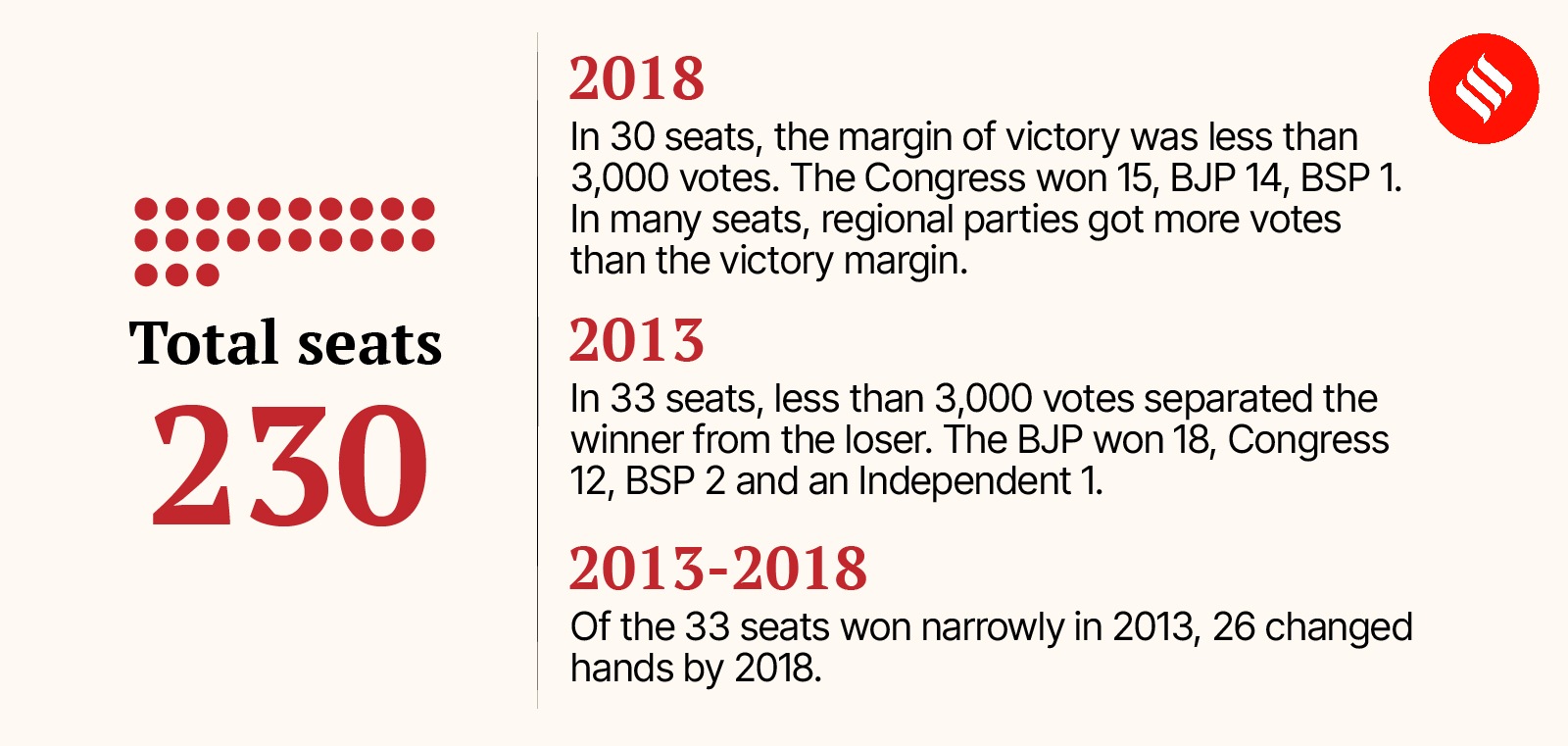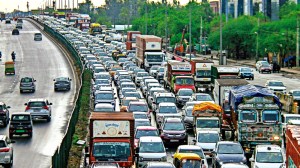As Madhya Pradesh heads for what looks like another close election, one data from the 2018 Assembly polls when the Congress just finished ahead of the BJP is telling.
In at least 30 seats (of the total 230 in the state), the margin of victory was less than 3,000 votes last time. The Congress won 15 of these seats and the BJP 14, with the BSP taking 1.

In the 2013 Assembly elections, which the BJP had swept, there were 33 such seats where less than 3,000 votes separated the winner from the loser. Of the 33, the BJP had won 18 seats, the Congress 12, the BSP 2 and an Independent 1.
This means that the role of smaller parties could be crucial in the state polls. These include the BSP, which has tied up with the regional Gondwana Gantantra Party (GGP), and the Samajwadi Party, which is looking at contesting 30-odd seats in Madhya Pradesh, after its plans to align with INDIA partner Congress fell through.

The BJP, which is staring at high anti-incumbency after nearly 20 years in power, has tried to get over this by transporting several heavyweights from the centre into the fray.
Of the 33 seats decided by narrow results in 2013, in 26, a different party won in 2018 – indicating how small swings could decide results here.
Of the 26 where the results changed from 2013, the Congress won 16 and the BJP 9 in 2018. An Independent won 1.
Story continues below this ad
Of the 7 seats where the same party won in 2013 and 2018, the Congress won 4 in 2018, and BJP 3.
In many of the constituencies in 2018 that were won by small margins, regional parties got more votes than the victory margin of the winning candidate.
In the elections scheduled for November 17, the SP has announced candidates for 9 seats so far. Of these, 3 were won by the Congress in 2018.
The Congress has also declared candidates in 5 of the 9 seats the SP has fielded nominees for.
Regional parties as key
Story continues below this ad
In the following eight Assembly seats in 2018, the victory margins were lesser than the votes garnered by smaller parties.
Vijaypur: The BJP defeated the Congress by 2,840 votes; the BSP got 35,628 votes and finished third.
Gwalior Rural: The BJP won, defeating the BSP by 1,517 votes. A party called the Bahujan Sangharsh Dal got 7,698 votes while the Aam Aadmi Party got 2,689 votes in the contest.
Gwalior South: The Congress won against the BJP by merely 121 votes. A BJP rebel contesting as an Independent got as many as 30,745 votes while the BSP candidate too took away 3,098 votes, the AAP got 646 and NOTA 1,550.
Story continues below this ad
Bina (SC-reserved): The BJP defeated the Congress by 460 votes. The Republican Party of India (A), whose vote base is Dalit, got 1,563 votes here.
Maihar: The BJP beat the Congress by 2,984 votes. The GGP took a big chunk, 33,397 votes, here while the SP got 11,202.
Timarni (ST-reserved): The BJP defeated the Congress by 2,213 votes. Here again, the GGP was seen to have hurt the Congress as it garnered 5,722 votes.
Deotalab: The BJP beat the BSP by 1,080 votes. Here, the SP was believed to have hurt the BSP as it got 2,213 votes.
Story continues below this ad
Rajpur (ST-reserved): The Congress won against the BJP by a margin of 932 votes. Here, the CPI got 2,411 votes and the AAP 1,510.
2018 overall picture
In the total 230 seats across the state, the BJP’s overall tally came down to 109 in 2018, from 165 in 2013. The Congress nearly doubled in this time, to 114 from 58.
Given that the Congress got 2 seats less than the half-way mark of 116, the party secured the help of 4 Independents and 1 SP and 1 BSP MLA each to form the government.
However, 15 months later, in March 2020, 23 Congress MLAs rebelled, bringing down the party’s Kamal Nath government. In the bypolls conducted for 26 seats later that year, the BJP won 18, the Congress 7, and an Independent got 1.
Story continues below this ad
Both the BJP and Congress have worked out action plans for the seats won by narrow margins. Rakesh Tripathi, the BJP media management in-charge for the Assembly polls, said the party is focusing at the booth level in areas where it lost narrowly in 2018 but bounced back in the 2019 Lok Sabha polls. They have identified 12,000 such booths, Tripathi said.
Madhya Pradesh Congress spokesperson K K Mishra said their action plan for such seats includes “micro-level organisational management to selection of the candidate as per local political scenarios”.


































